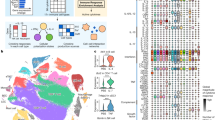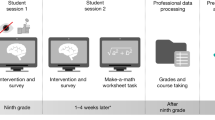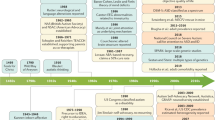Abstract
Survivors of pediatric hematopoietic cell transplantation (HCT) are at risk for impairment in cognitive and academic function. Most research to date has focused on the first years following transplant, and less is known about the long-term effects. We examined global and specific neurocognitive functioning in long-term (>5 years post HCT) survivors in comparison to both normative data and a sample of demographically similar healthy peers. A comprehensive battery of neurocognitive measures was obtained from 83 long-term survivors and 50 healthy comparisons. Analyses were conducted to assess for differences in neurocognitive functions between survivors, normative means, and healthy comparisons, and to examine the impact of medical and demographic variables on neurocognitive performance. Survivors’ performance was within the Average range across most measures, although significantly lower than both test norms and healthy comparisons on several measures. Despite generally intact neurocognitive functioning in the survivor group as a whole, survivors who experienced graft-vs.-host disease demonstrated slower processing speed and weaker verbal learning. Use of total body irradiation was not associated with any performance-based measure of neurocognitive functioning. Although subgroups of patients may be at relatively higher risk of neurocognitive impairment, the long-term neurocognitive impact for most survivors is relatively small.
This is a preview of subscription content, access via your institution
Access options
Subscribe to this journal
Receive 12 print issues and online access
$259.00 per year
only $21.58 per issue
Buy this article
- Purchase on Springer Link
- Instant access to full article PDF
Prices may be subject to local taxes which are calculated during checkout



Similar content being viewed by others
References
Bhatia S, Francisco L, Carter A, Sun CL, Baker KS, Gurney JG, et al. Late mortality after allogeneic hematopoietic cell transplantation and functional status of long-term survivors: report from the Bone Marrow Transplant Survivor Study. Blood. 2007;110:3784–92. https://doi.org/10.1182/blood-2007-03-082933.
Majhail NS, Tao L, Bredeson C, Davies S, Dehn J, Gajewski JL, et al. Prevalence of hematopoietic cell transplant survivors in the United States. Biol Blood Marrow Transplant. 2013;19:1498–501. https://doi.org/10.1016/j.bbmt.2013.07.020.
Mulcahy Levy JM, Tello T, Giller R, Wilkening G, Quinones R, Keating AK, et al. Late effects of total body irradiation and hematopoietic stem cell transplant in children under 3 years of age. Pediatr Blood Cancer. 2013;60:700–4. https://doi.org/10.1002/pbc.24252.
Smedler AC, Winiarski J. Neuropsychological outcome in very young hematopoietic SCT recipients in relation to pretransplant conditioning. Bone Marrow Transplant. 2008;42:515–22. https://doi.org/10.1038/bmt.2008.217.
Buchbinder D, Kelly DL, Duarte RF, Auletta JJ, Bhatt N, Byrne M, et al. Neurocognitive dysfunction in hematopoietic cell transplant recipients: expert review from the late effects and Quality of Life Working Committee of the CIBMTR and complications and Quality of Life Working Party of the EBMT. Bone Marrow Transplant. 2018;53:535–55. https://doi.org/10.1038/s41409-017-0055-7.
Coley SC, Porter DA, Calamante F, Chong WK, Connelly A. Quantitative MR diffusion mapping and cyclosporine-induced neurotoxicity. AJNR Am J Neuroradiol. 1999;20:1507–10.
Phipps S, Rai SN, Leung WH, Lensing S, Dunavant M. Cognitive and academic consequences of stem-cell transplantation in children. J Clin Oncol. 2008;26:2027–33. https://doi.org/10.1200/jco.2007.13.6135.
Aiello AE, Haan M, Blythe L, Moore K, Gonzalez JM, Jagust W. The influence of latent viral infection on rate of cognitive decline over 4 years. J Am Geriatr Soc. 2006;54:1046–54. https://doi.org/10.1111/j.1532-5415.2006.00796.x.
Sittinger H, Muller M, Schweizer I, Merkelbach S. Mild cognitive impairment after viral meningitis in adults. J Neurol. 2002;249:554–60. https://doi.org/10.1007/s004150200064.
Wang W, Enos L, Gallagher D, Thompson R, Guarini L, Vichinsky E, et al. Neuropsychologic performance in school-aged children with sickle cell disease: a report from the Cooperative Study of Sickle Cell Disease. J Pediatr. 2001;139:391–7. https://doi.org/10.1067/mpd.2001.116935.
Jacola LM, Krull KR, Pui CH, Pei D, Cheng C, Reddick WE, et al. Longitudinal assessment of neurocognitive outcomes in survivors of childhood acute lymphoblastic leukemia treated on a contemporary chemotherapy protocol. J Clin Oncol. 2016;34:1239–47. https://doi.org/10.1200/jco.2015.64.3205.
Jim HS, Small B, Hartman S, Franzen J, Millay S, Phillips K, et al. Clinical predictors of cognitive function in adults treated with hematopoietic cell transplantation. Cancer. 2012;118:3407–16. https://doi.org/10.1002/cncr.26645.
Arvidson J, Kihlgren M, Hall C, Lonnerholm G. Neuropsychological functioning after treatment for hematological malignancies in childhood, including autologous bone marrow transplantation. Pediatr Hematol Oncol. 1999;16:9–21.
Barrera M, Atenafu E. Cognitive, educational, psychosocial adjustment and quality of life of children who survive hematopoietic SCT and their siblings. Bone Marrow Transplant. 2008;42:15–21. https://doi.org/10.1038/bmt.2008.84.
Hiniker SM, Agarwal R, Modlin LA, Gray CC, Harris JP, Million L, et al. Survival and neurocognitive outcomes after cranial or craniospinal irradiation plus total-body irradiation before stem cell transplantation in pediatric leukemia patients with central nervous system involvement. Int J Radiat Oncol Biol Phys. 2014;89:67–74. https://doi.org/10.1016/j.ijrobp.2014.01.056.
Kupst MJ, Penati B, Debban B, Camitta B, Pietryga D, Margolis D, et al. Cognitive and psychosocial functioning of pediatric hematopoietic stem cell transplant patients: a prospective longitudinal study. Bone Marrow Transplant. 2002;30:609–17. https://doi.org/10.1038/sj.bmt.1703683.
Simms S, Kazak AE, Golomb V, Goldwein J, Bunin N. Cognitive, behavioral, and social outcome in survivors of childhood stem cell transplantation. J Pediatr Hematol Oncol. 2002;24:115–9.
Kramer JH, Crittenden MR, DeSantes K, Cowan MJ. Cognitive and adaptive behavior 1 and 3 years following bone marrow transplantation. Bone Marrow Transplant. 1997;19:607–13. https://doi.org/10.1038/sj.bmt.1700699.
Shah AJ, Epport K, Azen C, Killen R, Wilson K, De Clerck D, et al. Progressive declines in neurocognitive function among survivors of hematopoietic stem cell transplantation for pediatric hematologic malignancies. J Pediatr Hematol Oncol. 2008;30:411–8. https://doi.org/10.1097/MPH.0b013e318168e750.
Willard VW, Leung W, Huang Q, Zhang H, Phipps S. Cognitive outcome after pediatric stem-cell transplantation: impact of age and total-body irradiation. J Clin Oncol. 2014;32:3982–8. https://doi.org/10.1200/jco.2014.56.2223.
Lajiness-O’Neill R, Hoodin F, Kentor R, Heinrich K, Colbert A, Connelly JA. Alterations in Memory and Impact on Academic Outcomes in Children following Allogeneic Hematopoietic Cell Transplantation. Arch Clin Neuropsychol. 2015;30:657–69. https://doi.org/10.1093/arclin/acv053.
Perkins JL, Kunin-Batson AS, Youngren NM, Ness KK, Ulrich KJ, Hansen MJ, et al. Long-term follow-up of children who underwent hematopoeitic cell transplant (HCT) for AML or ALL at less than 3 years of age. Pediatr Blood Cancer. 2007;49:958–63. https://doi.org/10.1002/pbc.21207.
Gragert MN, Ris MD. Neuropsychological late effects and rehabilitation following pediatric brain tumor. J Pediatr Rehabil Med. 2011;4:47–58. https://doi.org/10.3233/prm-2011-0153.
Reddick WE, Conklin HM. Impact of acute lymphoblastic leukemia therapy on attention and working memory in children. Expert Rev Hematol. 2010;3:655–9. https://doi.org/10.1586/ehm.10.65.
Biederman J, Monuteaux MC, Doyle AE, Seidman LJ, Wilens TE, Ferrero F, et al. Impact of executive function deficits and attention-deficit/hyperactivity disorder (ADHD) on academic outcomes in children. J Consult Clin Psychol. 2004;72:757–66. https://doi.org/10.1037/0022-006x.72.5.757.
Ness KK, Gurney JG, Zeltzer LK, Leisenring W, Mulrooney DA, Nathan PC, et al. The impact of limitations in physical, executive, and emotional function on health-related quality of life among adult survivors of childhood cancer: a report from the Childhood Cancer Survivor Study. Arch Phys Med Rehabil. 2008;89:128–36. https://doi.org/10.1016/j.apmr.2007.08.123.
Rackley S, Pao M, Seratti GF, Giri N, Rasimas JJ, Alter BP, et al. Neuropsychiatric conditions among patients with dyskeratosis congenita: a link with telomere biology? Psychosomatics. 2012;53:230–5. https://doi.org/10.1016/j.psym.2011.09.003.
Sun A. Lysosomal storage disease overview. Ann Transl Med. 2018;6:476. https://doi.org/10.21037/atm.2018.11.39.
Wu CC, Econs MJ, DiMeglio LA, Insogna KL, Levine MA, Orchard PJ, et al. Diagnosis and management of osteopetrosis: consensus guidelines from the Osteopetrosis Working Group. J Clin Endocrinol Metab. 2017;102:3111–23. https://doi.org/10.1210/jc.2017-01127.
Marr C, Seasman A, Bishop N. Managing the patient with osteogenesis imperfecta: a multidisciplinary approach. J Multidiscip Healthc. 2017;10:145–55. https://doi.org/10.2147/JMDH.S113483.
Wechsler D. Wechsler intelligence scale for children, fourth edition (WISC-IV). San Antionio, TX: The Psychological Corporation; 2003.
Wechsler D. Wechsler adult intelligence scale, fourth edition (WAIS-IV). San Antonio, TX: The Psychological Corporation; 2008.
Wilkinson GS, Robertson GJ. WIde range achievement test—fourth edition (WRAT-4). Lutz, FL: Psychological Assessment Resources, Inc.; 2006.
Delis DC, Kaplan E, Kramer JH. Delis-Kaplan executive function system (D-KEFS). San Antonio, TX: The Psychological Corporation; 2001.
Gioia GA, Isquith PK, Guy SC, Kenworthy L. Behavior rating inventory of executive function (BRIEF). Lutx, FL: Psychological Assessment Resources, Inc.; 2000.
Delis DC, Kramer JH, Kaplan E, Ober BA. California verbal learning test—children’s version (CVLT-C). San Antonio, TX: The Psychological Corporation; 1994.
Delis DC, Kramer JH, Kaplan E, Ober BA. California verbal learning test—second edition (CVLT-II). San Antonio, TX: The Psychological Corporation; 2000.
Lafayette Instrument Company. The Grooved Pegboard test. Lafayette, IN: Lafayette Instrument; 2002.
Walsh KS, Noll RB, Annett RD, Patel SK, Patenaude AF, Embry L, et al. Standard of care for neuropsychological monitoring in pediatric neuro-oncology: Lessons from the Children’s Oncology Group (COG). Pediatr Blood Cancer. 2016;63:191–5. https://doi.org/10.1002/pbc25759.
Annett RD, Patel SK, Phipps S. Monitoring and assessment of neuropsychological outcomes as a standard of care in pediatric oncology. Pediatr Blood Cancer. 2015;62:S460–513. https://doi.org/10.1002/pbc25749.
Belanoff JK, Gross K, Yager A, Schatzberg AF. Corticosteroids and cognition. J Psychiatr Res. 2001;35:127–45. https://doi.org/10.1016/s0022-3956(01)00018-8.
Brown ES, Woolston D, Frol A, Bobadilla L, Khan DA, Hanczyc M, et al. Hippocampal volume, spectroscopy, cognition, and mood in patients receiving corticosteroid therapy. Biol Psychiatry. 2004;55:538–45. https://doi.org/10.1016/j.biopsych.2003.09.010.
Keenan PA, Jacobson MW, Soleymani RM, Mayes MD, Stress ME, Yaldoo DT. The effect on memory of chronic prednisone treatment in patients with systemic disease. Neurology. 1996;47:1396–402. https://doi.org/10.1212/wnl.47.6.1396.
Acknowledgements
The authors would like to acknowledge and thank the following individuals for their assistance with this study: Karen Martin-Elbahesh, Alanna Long, Hui Zhang, Christine Hartford, and Wing Leung. The study is supported in part by a grant from the St. Baldrick’s Foundation (ID 246618), and by the American Lebanese-Syrian Associated Charities (ALSAC).
Author information
Authors and Affiliations
Corresponding author
Ethics declarations
Conflict of interest
The authors declare that they have no conflict of interest.
Additional information
Publisher’s note Springer Nature remains neutral with regard to jurisdictional claims in published maps and institutional affiliations.
Rights and permissions
About this article
Cite this article
Parris, K.R., Russell, K.M., Triplett, B.M. et al. Neurocognitive functioning in long-term survivors of pediatric hematopoietic cell transplantation. Bone Marrow Transplant 56, 873–882 (2021). https://doi.org/10.1038/s41409-020-01125-5
Received:
Revised:
Accepted:
Published:
Issue Date:
DOI: https://doi.org/10.1038/s41409-020-01125-5
This article is cited by
-
Long-term neurocognitive and quality of life outcomes in survivors of pediatric hematopoietic cell transplant
Journal of Cancer Survivorship (2022)



